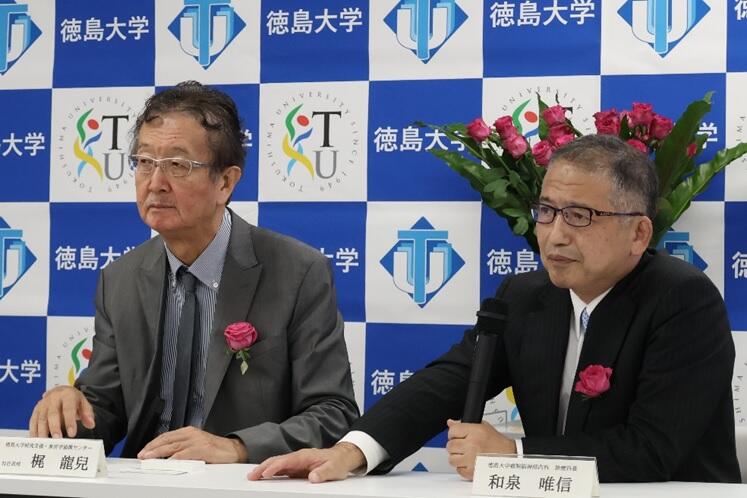On September 18 in Tokyo, a research group led by Designated Professor Ryuji Kaji of the Center for Research Administration and Collaboration at Tokushima University, Professor Yuishin Izumi of the Department of Neurology at Tokushima University Hospital, and Professor Satoshi Kuwabara of the Department of Neurology at Chiba University Hospital announced that "Rozebalamin (generic name: mecobalamin)" was approved for manufacturing and marketing. Rozebalamin is a new drug for the treatment of amyotrophic lateral sclerosis (ALS) based on the neuroprotective effects of high dose methylcobalamin (mecobalamin). An investigator-initiated clinical trial conducted in cooperation with Eisai Co., Ltd. confirmed attenuation of progression and prolongation of survival by approximately 500 days or more in ALS patients within 1 year of disease onset. Early regulatory approval and insurance coverage are expected.

ALS is a progressive disease that results in muscle atrophy and weakness due to degeneration of motor neurons. Although symptoms vary widely from person to person, patients die or require mechanical ventilation within two to five years after onset. About 2,500 new patients are estimated to be diagnosed annually in Japan, with a total of about 12,000 patients. The mechanism of pathogenesis and other aspects of the disease remain largely unknown. Most cases are sporadic, with hereditary cases accounting for only 5%-10%.
There are two existing drugs, riluzole and edaravone, approved for the treatment of sporadic ALS in Japan. Riluzole has been shown to prolong survival by 90 days, while edaravone has been shown to decelerate symptom progression. Nonetheless, the effectiveness of both drugs is limited, and the development of new drugs for ALS treatment is awaited around the world.
The research group's new therapeutic agent is methylcobalamin (active vitamin B12). Its use at a low dose has already been covered by insurance for peripheral neuropathy and megaloblastic anemia due to vitamin B12 deficiency. The investigator-initiated clinical trial to confirm therapeutic efficacy and safety was conducted as the randomized, placebo-controlled, double-blind, parallel-group study "The Japan Early-Stage Trial of Ultrahigh-Dose Methylcobalamin for ALS (JETALS)" at 25 centers in Japan, beginning in 2017. At a point in time when approximately 2 years had elapsed since the beginning of the trial, 130 patients were enrolled, and 129 were included in the analysis. The trial included ALS patients within one year of disease onset, and they were assigned to a group receiving high dose methylcobalamin (50 mg methylcobalamin, intramuscular injection) twice weekly or a group receiving placebo.
After 12 weeks of observation, the two groups were compared at 16 weeks of treatment. The results showed a progression attenuation effect to reduce the total score decrease on the amyotrophic lateral sclerosis functional rating scale-revised (ALSFRS-R) (severity rating scale) by about 43% and an extension of survival (until ventilator placement or death) of approximately 500 days or more in the high-dose methylcobalamin group. The drug was safe, and no patients discontinued it prematurely. Because it is an intramuscular injection, it can be taken by patients who have difficulty swallowing due to the progression of the disease. Its combined use with the existing drugs was considered possible. The placebo group has been receiving high dose methylcobalamin after week 16, and both groups will continue receiving the drug after the end of the treatment period, with the expectation of further prolongation of survival.
The research began when Kaji highlighted the mitigation of muscle twitching (small involuntary muscle movements) by high dose methylcobalamin reported in the 1980s and initiated a clinical study at Koto University. He conducted a clinical study on a few patients and reported in 1998 that high dose methylcobalamin administration improved the compound muscle action potentials. He continued his research, and after he moved to Tokushima University, he and Izumi reported in 2003 that survival was prolonged even in patients two years after the disease onset.
Based on these studies, Eisai started a sponsor-initiated trial in 2006 in patients within 3 years after the disease onset. The trial did not show significant differences in progression attenuation and survival duration between the drug and placebo groups. However, the disease progression evaluated based on the ALSFRS-R scores tended to be slower in the drug group compared to the placebo group. Meanwhile, a subsequent partial analysis of patients within one year of disease onset showed an increase in survival of approximately 600 days and a reduction in the total ALSFRS-R score decrease by approximately 45%, but methylcobalamin was not approved.
Therefore, the JETALS trial on ALSFRS-R was launched again in 2017 with the support of the Agency for Medical Research and Development (AMED). Patients within 1 year of disease onset were enrolled because the number of motor neurons in ALS patients can decline rapidly. The number of motor neurons has been reported to decline to 30% or less of the normal level within one year after disease onset. Earlier diagnosis and initiation of treatment are considered important.
In 2006, Kaji, Izumi, and their colleagues proposed new electrodiagnostic criteria for ALS (Awaji electrodiagnostic criteria), emphasizing electromyographic abnormalities. They also confirmed that ASL could be diagnosed six months earlier with the new diagnostic criteria than with conventional criteria. To diagnose the patients subject to the ALSFRS-R score evaluation, a revised version of the Awaji diagnostic criteria was used, allowing for a rigorous evaluation.
Moving forward, they will continue their research to establish guidelines effective for earlier diagnosis and elucidate the mechanism of high dose methylcobalamin action. A large decrease in homocysteine by the treatment was confirmed as a secondary evaluation item, suggesting that conventional mechanisms of methylcobalamin action other than neuroprotection may be applicable to high dose methylcobalamin treatment.
Izumi said, "I think it took too long, but I am more than happy that we can provide ALS patients with a new drug."
This article has been translated by JST with permission from The Science News Ltd. (https://sci-news.co.jp/). Unauthorized reproduction of the article and photographs is prohibited.




